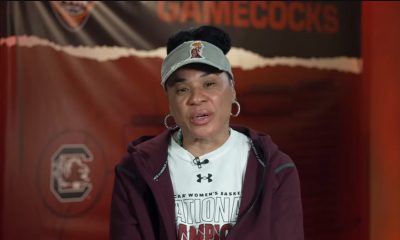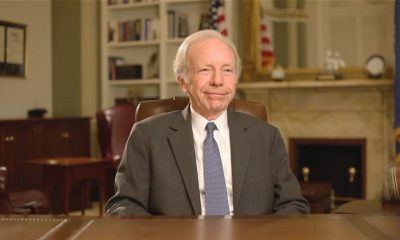News
DeVos: It’s OK if states discriminate against LGBT students
Education sec’y also won’t denounce racial discrimination
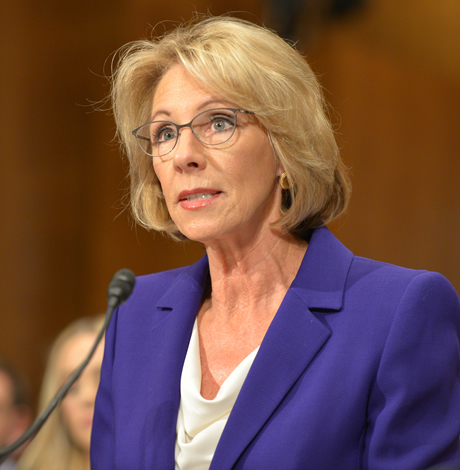
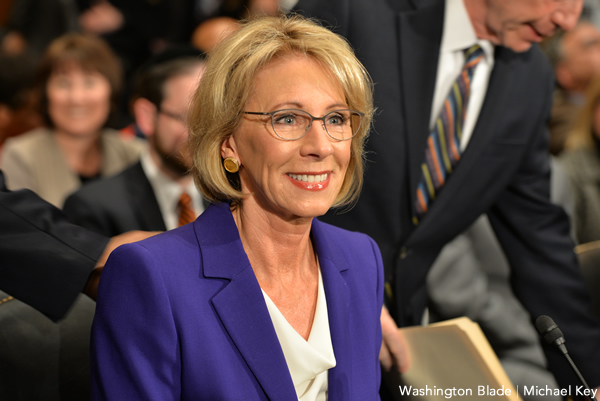
Betsy DeVos refused to denounce discrimination against LGBT students.
(Blade file photo by Michael Key)
Under a grilling during a congressional hearing Wednesday, Education Secretary Betsy DeVos refused to say she’ll speak out against discrimination against LGBT students — or even students experiencing racial discrimination.
Rep. Katherine Clark (D-Mass.) pressed DeVos during a House Appropriations subcommittee hearing on Lighthouse Christian Academy, a private school in Indiana the lawmaker says is the recipient school voucher money, but may not admit students from families with “homosexual or bisexual activity” or “practicing alternate identity.”
Clark asked DeVos, who’s advocating a budget that calls for a $250 million increase in school voucher funds, if she’ll “stand up that this school will be open to all students.”
DeVos first dodged the question, saying she’ll like to defer to earlier comment from lawmaker, and still refused to denounce the policy when asked to draw a line on state flexibility and reject money for schools discriminating on the basis of sexual orientation, race or special needs.
“For states who have programs that allow for parents to make choices, they set up the rules around that,” DeVos said.
Pressed further by Clark on whether the Education Department would withhold school vouchers on any situation regarding discrimination, DeVos again refused to answer.
“The Office of Civil Rights and our Title IX protections are broadly applicable across the board,” DeVos said. “But when it comes to parents making choices on behalf of their students…”
Davis interrupting by saying “this isn’t about parents making choices, this is about use of federal dollars,” and pressed DeVos who provided a non-answer about flexibility.
“So, if I understand your testimony,” Davis responded, “I want to make sure I get this right. There’s no situation of discrimination or exclusion that if a state approved it for its voucher program, that you would step and say that’s now how we’re going to use our federal dollars? There’s no situation, if the state approved it, that you would put the state flexibility over our students? Is that your testimony?”
DeVos began to say the situation was “hypothetical,” but Davis responded the situation was real and pointed to Lighthouse Christian Academy. At this point, the Republican chair of the committee informed Davis her time had expired.
“The bottom line is we believe that parents are the best equipped to make choices for their children’s schooling and education decisions, and too many children today are trapped in schools that don’t work for them,” DeVos said. “We have to do something different, we have to do something different than continuing a top-down, one-size-fits-all approach, and that is the focus, and states and local communities are best equipped to make these decisions and framework on behalf of their students.”
Davis, seemingly exasperated, concluded, “I am shocked that you could not come up with one example of discrimination that you would stand up for students.”
David Stacy, government affairs director for the Human Rights Campaign, was among those denouncing DeVos for refusing to denounce anti-LGBT discrimination.
“Taxpayer funds should never be used to discriminate against LGBTQ students, and it is shocking and disappointing that Secretary DeVos won’t make this basic commitment,” Stacy said. “Secretary DeVos has failed again to stand up for all students and ensure every child is able to receive an education free from harassment and discrimination.”
Federal law against discrimination in schools also prohibits charter and private schools from discriminating against students. Title VI of the Civil Rights Act of 1964 prohibits discrimination on the basis of race, color, and national origin for any school accepting federal funds, and Title IX of the Education Amendments of 1972 prohibits discrimination on the basis of sex for any school accepting federal funds. There is an exemption in Title IX for religious schools, but not for charter or secular private schools.
DeVos, who was narrowly confirmed by the Senate, has been a controversial figure and despised by charter school opponents for her support for school vouchers.
Earlier this year, DeVos and U.S. Attorney General Jeff Sessions revoked Obama-era guidance barring schools from discriminating against transgender students or denying them access to the restroom consistent with their gender identity.
Media reports indicated she resisted the change, but she ultimately agreed to it. Afterwards, DeVos met with transgender students and a trio of LGBT advocacy groups at the Education Department.
Sarah Kate Ellis, CEO of GLAAD, also denounced DeVos and said the education secretary was “turning a blind eye to LGBTQ students who experience discrimination in school.”
“DeVos once claimed she was an LGBTQ ally, but has now supported back to back policies that would erase LGBTQ students from classrooms,” Ellis said. “If she wants to be known as more than an anti-LGBTQ activist the time is now to reverse course.”
h/t Huffington Post
District of Columbia
Weekend brings two shootings in U Street, Dupont Circle areas
Man dies after incident at Desperados

A man was shot to death shortly after 1 a.m. on Saturday, April 27, inside the Desperados Burgers & Bar at 1342 U St., N.W., which is located on the same block a short distance away from the LGBTQ nightclub Bunker D.C. and around the corner less than a block away from the recently opened LGBTQ bar Crush on 14th Street, N.W.
The incident prompted Bunker to post on its Facebook page a message saying its security team quickly ushered patrons standing outside to enter the club and as a precautionary measure prevented patrons from leaving until it was deemed safe to do so.
A D.C. police statement identifies the shooting victim as Kenneth Goins, 43, of Salisbury, Md. The statement says officers on patrol in the 1300 block of U Street, N.W. heard gunshots at about 1:12 a.m. and immediately arrived at Desperados to investigate the incident.
“Officers located a man inside with multiple gunshot wounds,” the statement says. “Despite all life saving efforts, the victim was pronounced dead on the scene,” it says. Neither the statement nor a police incident report pertaining to the shooting provides a description of the person who committed the shooting nor discloses whether any of the customers inside the restaurant and bar witnessed the shooting.
The statement says the police Homicide Branch is investigating the shooting and urges anyone with knowledge of the incident to call police at 202-272-9099. Like all homicide cases, it says the D.C. Metropolitan Police Department offers a reward of up to $25,000 to anyone who provides information that leads to the arrest and conviction of the person or persons responsible for a homicide committed in the District.
“There was a shooting incident on U ST. N.W., just 4 doors down from BUNKER,” the Bunker Facebook post says. “Our security team promptly responded, ensuring the safety of everyone by ushering them inside for cover,” it says. “Currently, the courageous police officers are outside, handling the situation and working diligently to maintain a secure environment for our guests,” the message continues.
“As a responsible establishment, we strongly prioritize your safety, and as a precautionary measure, we will not permit anyone to exit the building until we deem it safe to do so,” the posting says. “Rest assured, we, as the owners, take this matter very seriously, and your safety remains our highest priority.”
The U Street shooting at Desperados Burgers & Bar took place a little over two hours after six people were shot and wounded outside the Decades nightclub at 1219 Connecticut Ave., N.W. near Dupont Circle and near several gay bars on P Street and 17th Street in the Dupont Circle area. Police said none of those who were shot suffered life-threatening injuries
A separate police statement says with the help of several witnesses, police identified and arrested Rennwel Mantock, 29, of Hyattsville, Md., in connection with the shooting on charges of Assault with Intent to Kill, Possession of Unregistered Ammunition, and Possession of an Unregistered Firearm. The statement says a gun belonging to Mantock was recovered on the scene. Court records show a judge has ordered him to be held without bond until a May 7 preliminary hearing.
“The detectives’ investigation determined Mantock opened fire after employees removed him from a nightclub following a dispute,” according to the statement.
A police arrest affidavit filed in D.C. Superior Court says Mantock told police at the time he was apprehended on the scene that he was dancing with a woman at the club when a security guard ordered him to leave and then “grabbed him by the neck and punched him in the face right before dragging him down the steps.” The Decades club states on its website that it has several floors with multiple bars.
According to the arrest affidavit, Mantock told police that one of the security officials punched him in the face again and threw him to the ground after dragging him out the door. It says Mantock “stated that he then pulled out his gun and started shooting” because “he was very upset about the security punching him in the face,” adding that he “began firing at the Decades’ security.”
The affidavit says five of the six people shot were Decades employees.
Gay former Dupont Circle Advisory Neighborhood Commissioner Mike Silverstein, who lives near where the shooting took place, said Decades is not known as a place that LGBTQ people patronize but said the surrounding neighborhood is home to many LGBTQ residents and draws many LGBTQ visitors.
National
GLSEN hosts Respect Awards with Billy Porter, Peppermint
Annual event aims to ‘inspire a lot of people to get active’
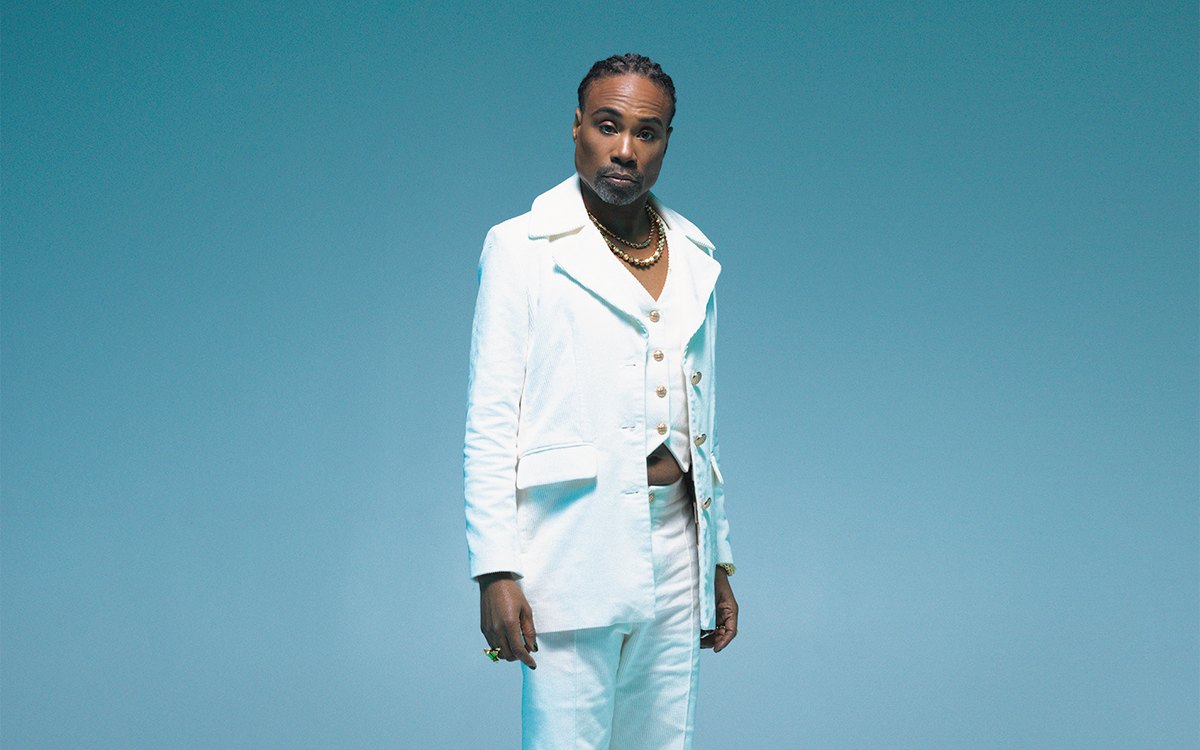
GLSEN will host its annual Respect Awards April 29 in New York, with guests including Miss Peppermint and Billy Porter.
Respect Awards director Michael Chavez said that the event will be moving.
“It will inspire a lot of people to get active and take action in their own communities and see how much more work there is to do, especially with all of the harmful things happening,” he said.
At the event, they will recognize the Student Advocate of the Year, Sophia T. Annually, GLSEN recognizes a student from around the country who is impacting their community.
“Sophia is doing incredible work advocating for inclusive sex education that is LGBTQ+ affirming, working with Johns Hopkins University to implement curriculum.” Chavez said.
Chavez calls the students that attend the Respect Awards the “biggest celebrities” of the evening.
“It is really important for the adults, both the allies and the queer folks, to hear directly from these queer youth about what it’s like to be in school today as a queer person,” he said.
GLSEN is a queer youth advocacy organization that has been working for more than 30 years to protect LGBTQ youth.
“GLSEN is all hands on deck right now, because our kids are under direct attack and have been for years now,” said actor Wilson Cruz.
Cruz is the chair of GLSEN’s National Board, which works to fundraise and strategize for the organization.
“I think we are fundamental to the education of LGBTQ students in school,” he said. “We advocate for more comprehensive support at the local, national, and federal levels so our students are supported.”
Chavez is one of the students that was impacted by this work. He led his school’s GSA organization and worked with GLSEN throughout his youth.
Cruz said Chavez is doing what he hopes today’s GLSEN students do in the future, which is pay the work forward.
“There’s nothing more powerful than people who have experienced the work that GLSEN does and then coming back and allowing us to expand on that work with each generation that comes forward,” he said.
Florida
Homeless transgender woman murdered in Miami Beach
Andrea Doria Dos Passos attacked while she slept
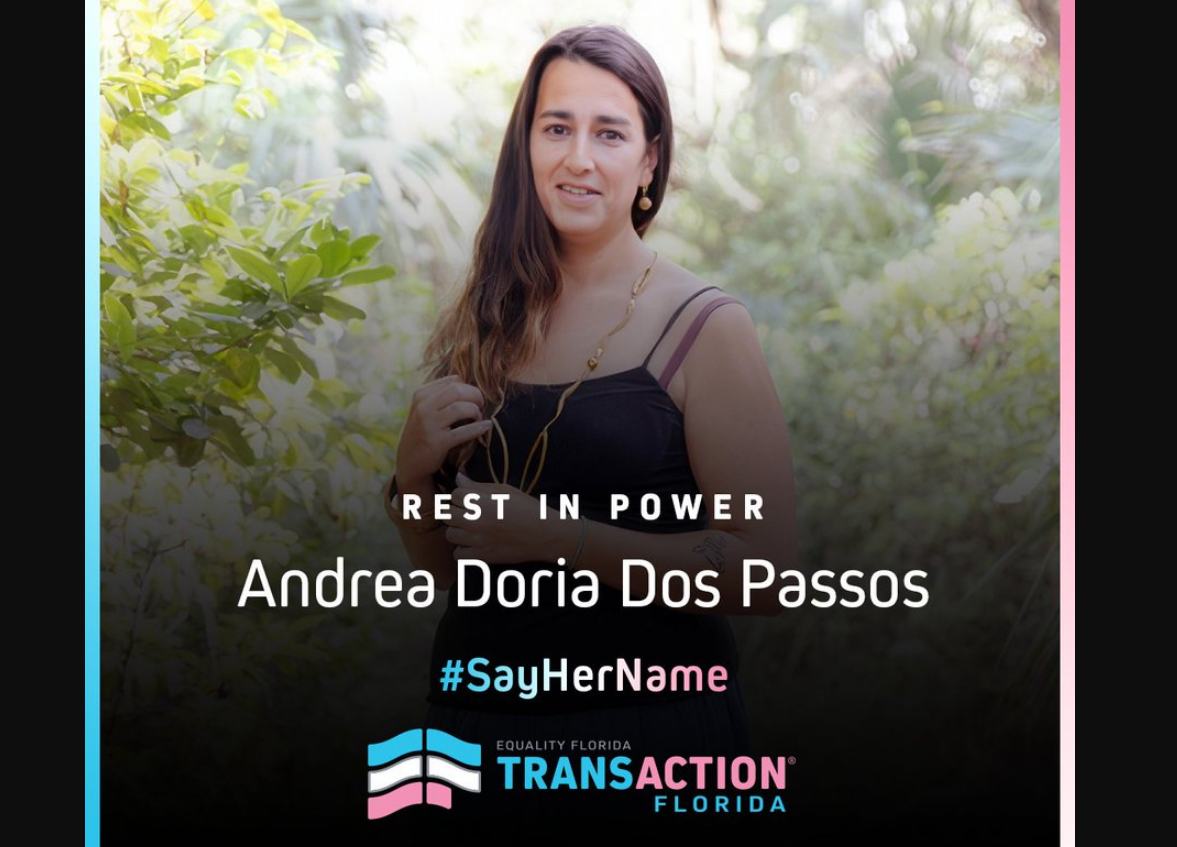
Gregory Fitzgerald Gibert, 53, who was out on probation, is charged with the second-degree murder of 37-year-old Andrea Doria Dos Passos, a transgender Latina woman who was found deceased in front of the Miami Ballet company facility by a security guard this past week.
According to a Miami Beach Police spokesperson the security guard thought Dos Passos was sleeping in the entranceway around 6:45 a.m. on April 23 and when he went to wake her he discovered the blood and her injuries and alerted 911.
She was deceased from massive trauma to her face and head. According to Miami Beach police when video surveillance footage was reviewed, it showed Dos Passos lying down in the entranceway apparently asleep. WFOR reported: In the early morning hours, a man arrived, looked around, and spotted her. Police said the man was dressed in a black shirt, red shorts, and red shoes.
At one point, he walked away, picked up a metal pipe from the ground, and then returned. After looking around, he sat on a bench near Dos Passos. After a while, he got up and repeatedly hit her in the head and face while she was sleeping, according to police.
“The male is then seen standing over her, striking her, and then manipulating her body. The male then walks away and places the pipe inside a nearby trash can (the pipe was found and recovered in the same trash can),” according to the arrest report.
Police noted that in addition to trauma on her face and head, two wooden sticks were lodged in her nostrils and there was a puncture wound in her chest.
Victor Van Gilst, Dos Passos’s stepfather confirmed she was trans and experiencing homelessness.
“She had no chance to defend herself whatsoever. I don’t know if this was a hate crime since she was transgender or if she had some sort of interaction with this person because he might have been homeless as well. The detective could not say if she was attacked because she was transgender,” said Van Gilst.
“She has been struggling with mental health issues for a long time, going back to when she was in her early 20s. We did everything we could to help her. My wife is devastated. For her, this is like a nightmare that turned into reality. Andrea moved around a lot and even lived in California for a while. She was sadly homeless. I feel the system let her down. She was a good person,” he added.
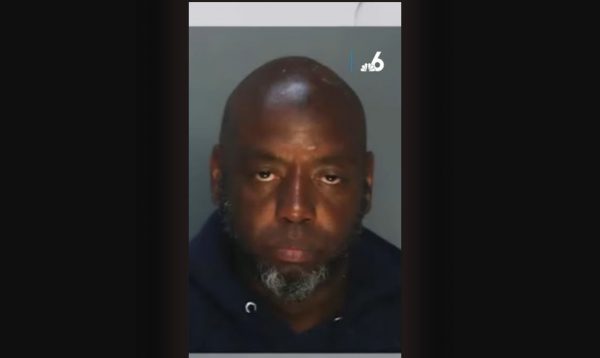
The Miami Police Department arrested Gibert, collected his clothing, noting the red shorts were the same type in the video and had blood on them. Blood was also found on his shoes, according to police. He was taken into custody and charged.
“The suspect has an extensive criminal record and reportedly was recently released from custody on probation for prior criminal charges. Police apprehended the suspect in the city of Miami and the investigation is currently ongoing. This case is further evidence that individuals need to be held accountable for prior violent crimes for the protection of the public. We offer our sincere condolences to the family and friends of the victim,” Miami Beach Mayor Steve Meiner said in a statement.
Joe Saunders, senior political director with LGBTQ rights group Equality Florida, told the Miami Herald that “whenever a transgender person is murdered, especially when it is with such brutality, the question should be asked about whether or not this was a hate-motivated crime.”
-

 District of Columbia4 days ago
District of Columbia4 days agoCatching up with the asexuals and aromantics of D.C.
-

 South America4 days ago
South America4 days agoArgentina government dismisses transgender public sector employees
-

 Mexico3 days ago
Mexico3 days agoMexican Senate approves bill to ban conversion therapy
-

 District of Columbia5 days ago
District of Columbia5 days agoBowser budget proposal calls for $5.25 million for 2025 World Pride



